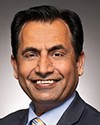Mr. Speaker, as this is my first speech in the new Parliament, I just want to take a moment to thank the citizens of Saskatoon West for once again returning me to Ottawa as their MP.
Of course at the same time, I want to thank some of those who helped me. I start with my family. We all know we cannot succeed in this place without our family behind us. I want to thank my wife, Cheryl; my sons, Kyle and Eric; and my aging parents, Alvin and Irene Redekopp, who were not able to help as much this time, but they are always behind me in spirit.
I had a core campaign team of Steve, Daniel, Jared, Marian, Lisa, Carol, Jason, Deb and Judy, and a core door knocking team of Ope, Yash, Sutter, Rito, Effay and Doug. I want to thank all volunteers, donors and everybody who helped.
I will continue to do my very best to represent Saskatoon West here in this place and bring the voices of Saskatoon here to Ottawa.
I will now talk about Bill C-3. It is recycled legislation, as the minister just pointed out, which was tabled as Bill C-71 in the previous Parliament. Actually, Bill C-71 was retread legislation of Bill S-245, a private member's bill that was heavily amended by the government with the help of the former party that used to exist in this place, called the New Democratic Party. The Conservatives opposed the bill then, and we continue to have significant issues with the bill.
There are three major parts to the bill. The first is citizenship by descent, the second is a provision for adopted children, and the third is fixing a problem with lost Canadians, which is an issue in the current legislation.
Conservatives cannot support the bill in its current form, and the main reason is the citizenship by descent. The bill would dilute the integrity of Canadian citizenship by automatically extending it to multiple generations born abroad with only a minimal connection to Canada. This is a classic Liberal solution to a problem. We have a problem, as the minister pointed out, and I will speak about a court case in a bit, and there are reasons this needs to be done, but the fix the Liberals came up with is a poor one. It is a bad one. It would not really solve the problem in an adequate way.
Conservatives will introduce amendments at committee. As Andrew Griffith from Policy Options said, “Canadian citizenship is a precious gift. At the committee stage, members of Parliament must be able to fulsomely examine the implications of an open-ended residency requirement”, and we will do that.
I first want to speak about citizenship by descent, why it is problematic, and why we will vote against. For some background, how did we get here? Prior to 2009, it was possible for Canadian citizens to pass on their citizenship to endless generations born outside Canada. A person did not need to have much of a connection to Canada; they could have never lived in Canada but yet could pass on citizenship over and over, generation after generation.
Something happened in the mid-2000s, a crisis in Lebanon, and many Lebanese Canadians were concerned about their safety and the situation going on in Beirut, so they made sure they passed their citizenship on to their children. When things got really, really difficult in Beirut, they called on the Canadian government to rescue them. In 2006, the Canadian government spent $94 million bringing about 15,000 Lebanese Canadians to Canada. They were Canadian citizens, but for the most part they had rarely or never lived in Canada. These people benefited from citizenship with minimal connection to Canada, and they became known as the “Canadians of convenience”.
Interestingly, what happened is that a lot of these people were rescued from Beirut, came to Canada for a bit, but many of them went right back to Lebanon, and that was it for their connection to Canada, but it cost Canadian taxpayers $94 million. This led to a bill by the Harper government to create what was known as the first-generation rule.
After 2009, the rule changed so a citizen born outside of Canada could pass their citizenship to their child born outside of Canada for one generation, but someone from the next generation born outside of Canada was not automatically a citizen. That was called the first-generation limit, and the bill now would effectively abolish that rule and allow people to confer citizenship on their children generation after generation for one measly requirement of spending 1095 days in Canada, which I will talk about a little more. All someone would need to do to meet the requirements is live a few years in Canada.
Why are we doing this now? In 2023, the Ontario Superior Court ruled that the first-generation rule was unconstitutional, so the Liberal government, in its great wisdom, chose not to appeal it but to just accept that ruling. It could have appealed it to a higher court, and it chose not to; it committed to changing the law.
The court did say, though, that it was reasonable to apply a substantial connection test. It understood that we cannot just give citizenship out like candy; there has to be some sort of a connection to Canada. The court said that if we put in some sort of a substantial connection test, that would be okay according to the law.
The Liberal government chose to create a substantial connection test that is not substantial at all. The test is 1,095 days, which is about three years. People would have to spend that much time in Canada prior to the birth of a child. It is not consecutive days; it could be a month here, a month there, and three years is very weak. The government would not even know, really, if people have been in Canada for that time. There would be an affidavit that a person would sign. It is a very weak way to commit to being a Canadian citizen and then to confer that citizenship onto children. It is not a real test of commitment, because the days do not have to be consecutive.
The other issue is that there would be no criminal background check at all. Once again, we could be passing on citizenship to children who potentially could have serious convictions or a criminal background, but we would not know because we would not even check. When we have newcomers coming to our country, the government puts a lot of effort into checking the security background of those people, and it can take up to a year or longer for newcomers to get processed through security.
Andrew Griffith, from Policy Options, said:
To remedy the issue, Bill C-71 [speaking about the previous legislation] uses residency as the “substantial connection test.”
However, the new standard in Bill C-71, which requires a foreign-born Canadian parent to have spent a total of 1,095 days in Canada...differs significantly from what is required of new Canadians.
...the government has failed to fully consider the implications of such an open-ended condition.
I might note that in the U.S., people can confer citizenship only to the first generation. They have to have at least five years in the U.S., with two of those years being after the age of 14, and there is also very strict screening. In the U.K., it is only the first generation that can be admitted. There are some very strict rules in our partner countries that the Liberal government has chosen not to enforce, creating an extremely weak connection test.
This brings up a question: What does it mean to be a citizen? I believe that the bill cheapens that. There is an organization called the Institute for Canadian Citizenship. It does great work on this subject of citizenship and helps a lot of newcomers in our country. Daniel Bernhard, who is the CEO, said this:
The sense of belonging is very powerful. If people don't consider Canada to be their society, then they won't dedicate themselves to it, or get involved in our culture and contribute their utmost to making our society a success. That's a danger of concern to all of us.
We must roll up our sleeves to restore the value of being Canadian.
Citizenship is a connection to one's home country. It is being there for one's country in times that are good and bad. It is enjoying the peace of Canada, proudly participating in wars when necessary and being available for keeping the peace at other times. Also, people need to understand the current situation in our country. They need to live here to understand how things are and some of the issues we have right now in our country, with an epidemic of crime; expensive and unavailable housing; difficulties in health care, including trying to find doctors and waiting lists; high taxes; and a drug crisis, including fentanyl, in our country right now. People do not know that if they are living in another country.
It is also important to understand our history and be proud of our accomplishments, such as being proud of our sports teams, even though some people may cheer for sports teams outside of Canada. Nobody does that, right? We need to be proud of our teams and of the beauty in our country. We need to believe in our Canadian values and norms: democracy, equality and not engaging in religious squabbles and wars. Many people come to our country from other countries, and they bring their culture, food and all the good parts of their countries. Often, they are escaping bad situations, including war and fighting. We do not need to bring those wars to Canada; we can bring the good parts and build a country and a society that works for us here.
People who come here enjoy our social safety net, but it is so important that they participate by paying taxes in order to enjoy that. It is something that Canada is proud of; we take great care of our people, but there is a cost for that. It is very unfair when people who have never had any participation in our tax system then expect to receive benefits from it.
Canadians proudly display our Canadian flag on Canada Day and, of course, are allowed to vote in elections to decide governments.
In 2010, one of our best immigration ministers ever, Jason Kenney, said the following:
Citizenship is about far more than a right to carry a passport or to vote. It defines who we are as Canadians, including our mutual responsibilities to one another and a shared commitment to the values that are rooted in our history, like freedom, unity and loyalty. That is why we must protect the values of Canadian citizenship and must take steps against those who would cheapen it.
I think the legislation would actually cheapen it. The Liberals have worked hard to cheapen what it means to be a Canadian citizen. I point to the comments made by the previous prime minister, Justin Trudeau, about Canada being a postnational country and about how citizenship and being Canada does not mean much other than the borders around us.
We just have to look at the passport to see that. The way the Liberal government changed the passport to take away all the symbols that mean anything and replace them with meaningless pictures and things that do not mean anything and do not provide any sense of what it means to be Canadian is just a small example of the way the government has been moving to cheapen citizenship. I believe that the bill would just add further to that.
One of the big concerns that I have is also the uncontrolled citizenship expansion that would be allowed through the bill. Ken Nickel-Lane, who is an immigration consultant, said in the Times of India, “This announcement, at least on initial reading looks like it will open up the chain of citizenship without end”. He is completely correct about that.
When the issue under the previous legislation was at immigration committee in the previous Parliament, we asked many questions to IRCC department officials about how many people would receive citizenship under the provisions. They could not answer the question. They would not answer the question. We asked repeatedly, and we asked in many different ways. They never answered the question.
The Parliamentary Budget Officer actually did a study on the bill, on Bill C-71 in the last Parliament, and estimated that it would create at least 115,000 new citizens in the first five years, most of them living abroad. Of course, that number could then double every generation, so we could end up with a lot of new citizens who really have minimal connection to Canada and just do not ever actually participate in anything in Canada. Andrew Griffith from Policy Options said, “There are an estimated four million Canadians living outside Canada, [and] about half of them were born abroad.”
We have to be very careful that we do not add to our burdens by giving citizenship to people who do not participate in Canada at all. It is just no surprise the government cannot answer questions about numbers. People who were here last week might recall that when we were questioning the minister on the estimates, we asked all kinds of questions about really key marquee policy items.
One of the marquee policies of the Liberal government is to reduce non-permanent residents. I was asking the minister about these numbers, and she did not have any clue what they were. Another marquee policy is reducing the population this year. The overall population is projected by the government to drop by half a million people, but it has not dropped at all yet, and yet the minister seemed to have no knowledge of that. Therefore it does not surprise me that the minister and the department have no clue how many people the legislation would impact. I think that is really to know how it would impact Canada.
Another issue that goes along with that is the cost. How much would it cost taxpayers to have the legislation? Again, IRCC officials had no clue; they did not have an answer to that. Apparently they had not looked into it at all, but the Parliamentary Budget Officer did and estimated it would be about $21 million in admin costs over five years. That would be to process additional claims for citizenship, passports and applicants to social programs.
By the way, if 115,000 people started getting old age security at age 65, if these people actually came to live in Canada and collected old age security, that would be a billion dollars a year. The potential for cost to the Canadian taxpayer is very, very huge here. We cannot underestimate that.
Andrew Griffith said, “IRCC needs to determine and share estimates for the approximate number of new citizens expected under the change, along with the incremental workload and resources that are required before the bill goes before committee.” I would echo that. We need to know those numbers so we can properly study the bill.
To summarize citizenship by descent, it would remove the first-generation limit and allows citizenship to be conferred generation after generation with a simple, weak, “substantial connection” test of 1,095 non-consecutive days in Canada. There would be no criminal background check at all required with this. For those reasons, we cannot support it.
There is a second provision in the bill, and that is the provision for adopted children. Currently, if a person adopts a child from abroad, once the adoption is completed, they have to go through the process of applying for permanent residency for them, just like anyone else would, and it takes a long time. There are a lot of costs involved, legal costs, and it can be a stressful time for a new family. The bill would essentially treat an adopted child from abroad as though they were born in Canada, so once the adoption is finalized, that child would be given Canadian citizenship. We support that. We support the equal treatment of adopted children. We have done that in the past, and we will continue to support that. It makes sense. It is a common-sense change, so parents would not be penalized for adopting children from overseas and those children could be treated in the same manner as they would be if they were born in Canada. I spoke to this in the previous Parliament when it came up at committee. The chair well knows that we supported it, and we would support this provision if it were by itself.
The third part of this legislation is on restoring lost Canadians. This part is also reasonable, and when it came to committee, we were supportive of it. The easiest way to understand it is that immigration and citizenship law is very complicated. When changes are made over the years, sometimes there are unintended consequences, which is what happened here. There was a group of people born within a four-year stretch, from I believe 1977 to 1981, who had to apply for citizenship by the age of 28, and if they did not, they lost it, which was never the intention of the law. It was just a glitch that ended up there because of the way the laws were amended over the years, so this does need to be fixed, because nobody should lose their citizenship. In fact, Senator Yonah Martin brought this forward in Bill S-245, and she said:
Many of these individuals were raised in Canada from a young age. Though they were born abroad, some came to Canada at a young age, as infants, in some cases. They went to school in Canada. They raised their families in Canada. They worked and paid taxes in Canada, and yet, they turned 28 without knowing that their citizenship would be stripped from them because of the change in policy [in] 1977 that required Canadians...to apply to retain their citizenship when they turned 28.
That is the essence of what this piece of the bill would do. It would fix a problem that came about because of unintended consequences. The bill that was brought in by Senator Martin was intended to just fix this issue, because many had tried to fix it, but nobody succeeded. Unfortunately, when it came to committee, the Liberal government, with the help of the former party that used to exist in this place, the New Democrats, actually ganged up on Senator Martin's private member's bill and made substantial changes to it to incorporate things such as citizenship by descent. It was a very unfair thing to have a private member's bill commandeered by the government, with the help of NDP members, yet that is what happened, so that bill did not make it forward. It is a reminder to the House that we need to respect certain things, and private member's bills are something that really need to be respected.
To summarize, there are elements of the bill that we support, as I mentioned. We support the elements dealing with adoption and with lost Canadians, but we cannot support citizenship by descent for endless generations. We cannot allow endless generations to have a very weak connection to Canada and still get their citizenship conferred. We cannot stand by and not have a background check, and we have to be very careful that we do not create new unintended consequences, as has happened in the past.
I must remind everyone that the Liberals broke our immigration system. For years, Canadians agreed on immigration. We brought in skilled labour to fill gaps in our labour force. We helped displaced and poorly treated people from all over the world find a new home in Canada. We had a balanced, reasonable and fair policy for immigrants, which was good for our economy and it was good for Canada, but then the Liberals blew it up. They opened the floodgates. They brought in millions of people and jammed up the bureaucracy so that files now take years to process, and having too many cases led to mistakes. Last year, a father and son were given a security clearance even though there was a video from 2015 that showed them violently participating in things, and they were actually planning a terror plot. Mistakes happened because of jammed up systems.
Let us be clear that this is not the fault of newcomers to our country. Clearly, it is the fault of the government. Immigrants were just doing what the Liberal government asked them to do. They had no idea they were coming to a country that was not prepared for them. This left all Canadians dealing with housing shortages, sky-high job shortages, health care problems, etc. Conservatives believe in strong, fair immigration citizenship rules that respect—























































































